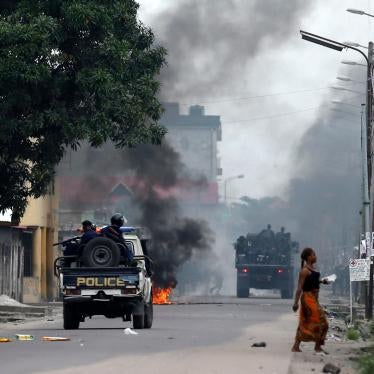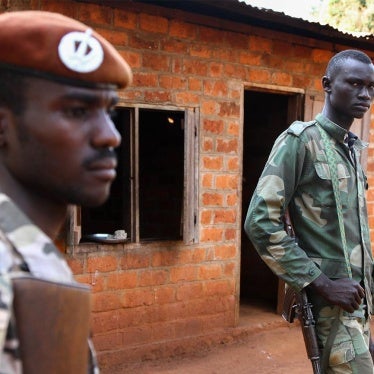In Global Trade, Local Impact: Arms Transfers to All Sides in the Civil War in Sudan, Human Rights Watch calls for an international arms embargo on both the government of Sudan and Sudanese rebels, accusing both sides of gross violations of human rights and international humanitarian law.
Attached to this press release are excerpts from the 51-page report referring to Usama bin Ladin, the Saudi millionaire whose alleged training facilities were bombed by U.S. forces in Afghanistan today, and to allegations about a chemical weapons facility in Sudan.
The report documents a steadily intensifying series of conflicts and conflicts-within-conflicts generally ignored by the international public, but not by global arms traders. "The evidence shows a pattern of significant arms transfers to long-established human rights abusers — the government of Sudan and the Sudan People’s Liberation Army (SPLA) — that is serving to intensify the conflicts within and around Sudan and increasing their impact on civilians there," said Hiltermann. Ever larger populations are at risk, often due directly to the types of weapons used (for example, antipersonnel landmines) or the way in which they are used. The entire region remains awash in cold war-era arms, while the spread of combat in the 1990s has prompted further arms imports that are aggravating an already dangerous situation.
The external actors most directly involved in arming the government of Sudan, or providing other forms of military assistance (including training, technical assistance, and funds), have been China, Iran, Iraq, former Soviet bloc states, South Africa, France, Malaysia, and, at a less significant level, a number of other states. Moreover, weapons and ammunition of apparent Belgian, British, Bulgarian, Chilean, Israeli, Italian, Swedish, and U.S. origin have been found among government stocks captured by rebel forces. In the view of Human Rights Watch, governments remain responsible for the ultimate use of their weapons, even if they did not originally supply them to abusive forces.
In recent years, the government of Sudan has continued to enhance its conventional arms capability through the acquisition of large quantities of light and medium arms and ammunition, medium tanks, and artillery and air power. The increased use of Mi-24 helicopter gunships, MiG fighter-bombers, and Antonov-26s since 1996 has had considerably more impact on civilians than on combatants, and has contributed to the displacement of tens of thousands of civilians in eastern and northeastern Sudan, the sites of new fighting in 1997 and 1998. The acquisition by the government of substantial numbers of a modified version of the classic Soviet T-54 tank — a Chinese-made model, known as the T-59 — in 1997 suggests a possible further intensification of the conflict. If, in addition, the government of Sudan has managed to acquire SCUD missiles, as is alleged by a Sudanese diplomat who defected in 1997, the potential exists for a widening of the regional scope of the conflict, and possibly an intensification of the fighting itself. The government of Sudan itself has been actively engaged in training, equipping, and in other ways supporting armed groups which are spreading violence throughout the immediate region and beyond, for example the Lord’s Resistance Army (LRA), which has operated in southern Sudan and northern Uganda.
Among the other weapons having a direct impact on civilians in the war have been antipersonnel landmines. Human Rights Watch observed hundreds of landmines of many types — some whose origins traced back to the 1950s and 1960s, others of recent vintage — in Sudanese government military storage areas in southern Sudan captured in 1997 by opposition forces. Human Rights Watch also observed large numbers of landmines of the same types and nearly identical lot numbers in areas of neighboring Eritrea and Uganda which had been taken from rebel groups supported by the government of Sudan. While all sides to the conflicts within Sudan and in neighboring states have accused each other of deploying landmines, the main evidence Human Rights Watch saw of their use was by the government of Sudan.
For its part, the SPLA, and its allies in the coalition National Democratic Alliance (NDA), have received political, military, and logistical support from Eritrea, Ethiopia, and Uganda. Eritrean tank crews and trainers, as well as close reconnaissance units, accompanied SPLA troops in a March 1997 campaign in southern Sudan. Ugandan troops have entered Sudanese territory on the side of the rebels and engaged government forces and rebels of the LRA in combat on a number of occasions. Eritrea, Ethiopia and Uganda, in turn, have received military support from the United States, and also have large stores of cold war-era arms left over from the U.S., Israel, the former Soviet bloc states, North Korea, and other states.
The SPLA has a substantial mechanized fleet of tanks and armored cars, some of which it claims to have captured from the government of Sudan in 1996 and 1997. Others were provided by Ethiopia in the 1980s or obtained from sources on the international arms market via Uganda in the 1990s. Another NDA member, the Sudan Alliance Forces (SAF), is also known to have acquired T-55 tanks — capturing them from the government of Sudan in April 1997 — and is said by its own leaders to be using them in combat. The presence of such arms, as well as artillery, makes it likely that there will be further bouts of conventional warfare in and around major population centers, such as Juba, Wau, and Malakal in the south and Gedaref and Kassala in the northeast.
Violations of human rights and the laws of war have been widespread, systematic, and prolonged throughout the civil war in Sudan. Human Rights Watch holds that armed forces that commit gross violations of international human rights or humanitarian law (the laws of war), be they governmental or rebel groups, should not be further armed by members of the international community. Human Rights Watch therefore calls on the international community to immediately institute an arms embargo against both the government of Sudan and anti-government insurgents united in the NDA in order to send a strong signal to all sides in the war that their abusive conduct will no longer be tolerated. The European Union’s arms embargo on Sudan appears by and large to have been effective; it now needs to be extended to the international community as such. An international embargo should remain in place until all sides have put a halt to serious violations of international human rights and humanitarian law, and have brought to justice serious offenders. Other recommendations by Human Rights Watch concern the United Nations, the Organization of African Unity, the European Union, states neighboring Sudan, the government of Sudan, and Sudanese rebel groups.





